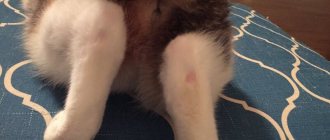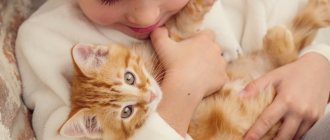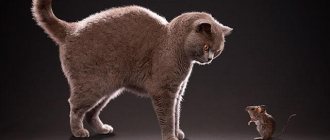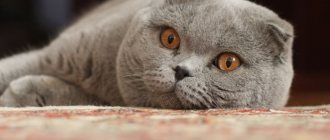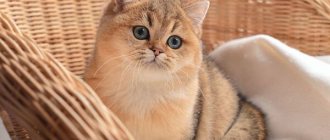Scottish cat stands like a gopher
One of the distinctive features of Scottish Folds and Scottish Straights, as well as the long-haired varieties of this breed, is that they can stand on their hind legs like gophers. It's funny because they also resemble people. Scottish cats have a special body structure that allows them to stand on their hind legs. In particular, the Scots have a wide butt, so it is convenient to lean on it with all your weight.
Article continues after advertisement
Usually Scots take such poses when they are very interested in something, but it is out of their field of vision. The stand allows you to stand higher and see everything you need.
Why does a cat stand on its hind legs: 6 reasons
Sometimes you can see how cats stand on their hind legs, resembling meerkats or toy puppets. What makes normally majestic and independent animals behave in such a way that is unusual for them? Is there a scientific explanation for this? And what do our pets want to achieve by adopting this position? At least six reasons can serve as an explanation.
Repelling for self-defense
One of the reasons for this behavior may be a clash with a predator or another representative of its kind. Feeling threatened, the cat stands on its hind legs to appear taller and larger than its size.
You may also have noticed how cats before a fight walk sideways, arching. This also makes them more intimidating to the enemy. Sometimes it helps to avoid a fight, thanks to intimidation alone.
Participation in games
The reason for standing on its hind legs may also lie in ordinary entertainment. By moving into this position, the cat can attack you or any objects, doing this in game mode, without showing aggression.
Treat or treat
Sometimes our cats are like children in monster costumes, going door to door collecting tasty treats. At least that may be the goal. Standing on its hind legs, the cat will demand something tasty from you. At the same time, he looks quite convincing and cute, so it’s difficult to refuse feeding.
Like meerkats
Standing on their hind legs and stretching out, cats look like meerkats. Why do these animals from the mongoose family do this? They look very curious and funny when they look into the distance, stretching their whole body upward. This is how they detect predators in order to warn their relatives about the danger. They also notice prey in the form of snakes and rodents. And yes, first of all, they are driven by curiosity. Perhaps this feeling also guides cats when they, standing on their hind legs, cautiously explore something new.
munchkins
Munchkin cats have very short legs, which makes them so cute and defenseless. These members of the feline family can often be seen standing on their hind legs. The thing is that their natural stockiness pushes them to this. After all, the center of gravity of these cats is too low.
Injury or congenital abnormalities
For some cats standing on their hind legs, this position is not some kind of quirk or manifestation of some feelings. They are forced to do this by injuries to their front legs or even the absence of them. Such animals simply physically cannot accept the usual position of cats, and are forced to always stand or sit on their hind legs.
It also happens that pets are already born with similar deformities. There are examples when, at the birth of cats, their front legs stopped developing, remaining short. Such animals are forced to jump on their hind legs, like a kangaroo.
We should not forget that cats are completely unpredictable, independent animals. They do exactly what they want at the moment. The same may apply to standing on its hind legs for reasons known only to the pet itself.
Author: Kristina Rudakova Source:
Is it possible to teach a Scottish kitten to sit and stand?
You can teach a Scottish cat to obey the command to stand upright. But first you need to understand why she does this. Scottish cats become like gophers when they want to see something that they cannot see because it is blocked by another object. So they do a stand to become taller. Therefore, in order to teach a cat to perform this action on command, it is necessary to catch the moment when it becomes itself and say a command, for example, “Gopher.” You need to do this every time. Perhaps over time your pet will remember the word and follow the command.
Also, Scots can stand up if they are given a treat and lift it up. This is how dogs are taught to serve. But you shouldn’t rejoice too early, since Scottish cats are not very trainable and do something only when they consider it beneficial for themselves. Therefore, after following a command, it is advisable to always reward the cat with a treat.
It is worth noting that not all Scots are inclined to stand upright or sit on their butts. If your Scot is like this, then you won’t be able to teach him.
Rate and share!
What can you teach a cat
The commands that are taught to dogs can also be taught to cats, especially curious ones. She can learn to sit, lie down, give a paw, fetch a toy and do various tricks. You can teach your pet elements of a circus program: jumping through a hoop, walking on its hind legs, fetching a ball.
Of course, training cats is different from training dogs; these are different types of animals, and they need an individual approach.
Special training systems have been developed for cats and are used by people at home. With regular exercise, even a 2-month-old kitten will achieve positive results.
Special conditions must be created for training, then the result will be as effective as possible:
- Your four-legged friend must be in good health.
- It’s better if the cat ate a long time ago, then rewarding it with a treat works better.
- A good, playful mood between the owner and the cat - it is important that the pet enjoys the process.
- The lesson should not last long, no more than five minutes: cats quickly lose interest in training.
- Age also matters - you should not train small kittens, less than two months old or old kittens, most likely this will not bring the desired results.
Pricing Features
The price of a Munchkin cat in Russia ranges from 20,000 to 100,000 rubles. You can determine how much a munchkin breed costs by taking into account pricing factors.
Prices for a Munchkin kitten vary / Yandex Collections
Gender of the animal
Cats are larger, stronger, more muscular. The cats are graceful, light, miniature.
Cats are more expensive than cats. You can get offspring from a female; she brings additional profit to the owner.
Therefore, knowing how much a munchkin cat costs is important for a person who plans to breed animals.
Important! When purchasing a pet, it is necessary to clarify whether the animal has been sterilized. Castrated and sterilized cats and female cats are valued much less.
Age
Mostly, future owners are interested in how much a munchkin kitten costs. A kitten will cost more than an adult animal.
Place of purchase
Before buying a pet, you need to find out how much a munchkin cat costs in a nursery, on the market, or on the Internet. Prices vary greatly.
Nurseries offer kittens at a price of 25,000 - 50,000 rubles. In elite nurseries, prices reach 70,000 rubles per kitten.
Using advertisements on the Internet, you can find a pet for 5,000 – 15,000 rubles.
Buying a munchkin on the market is the cheapest. A kitten will cost 2000 – 5000 rubles. But the seller on the market does not give any guarantees.
An animal acquired by hand may have significant defects in appearance and serious health problems.
Passport and pedigree
The presence of documents is confirmation of the purity of the breed. The kitten must have a metric containing information about the parents. A veterinary passport confirms that the animal is healthy and has no developmental disabilities.
A cat with a pedigree and all documents costs from 20,000 to 50,000 rubles.
Red fluffy munchkin kitten/Yandex Collections
External data
Compliance with breed standards means that the animal does not have physical or mental disabilities.
The Munchkin breed allows for a wide variety of types.
Cats with very short legs and unusual eye and coat colors are more valuable.
You can only buy a cat that fully complies with all breed standards in a good nursery.
Kitten class
The most important factor that determines how much a munchkin kitten costs, the price in the nursery, on the Internet, on the market, is belonging to a certain class.
An important factor that determines how much a munchkin kitten costs - class/Yandex Collections
Dependence of price on class
1. Show class. These are cats that best meet the standard of external characteristics and have an outstanding pedigree. Animals are distinguished by excellent health, stable psyche, and do not have developmental disabilities.
Show class kittens are not neutered; they are the standard of the breed and are allowed for breeding.
The elite class includes munchkins with the shortest legs. Show-class cats cost from 80,000 to 200,000 rubles.
2. Breeding class. The kittens also meet the standard, are healthy, can participate in exhibitions, and are allowed for breeding. But they have some disadvantages that do not allow them to be classified as the highest class.
The average cost of a kitten is 20,000 – 80,000 rubles.
3. Pet class. The cheapest animals. Such kittens do not have documents and have significant defects in appearance. Cats are not allowed for exhibitions or breeding.
Pet-class kittens cost from 2,000 to 15,000 rubles.
Little munchkin kitten/Yandex Collections
Separately, munchkin hybrids can be distinguished. Cats are crossed with representatives of other breeds.
The result is short-legged cats with the external characteristics of a certain breed. There are many munchkin hybrids, they all have their own names.
In general, they are called by a common word - dwarves (gnomes).
You can only find out how much such a cat costs from private breeders.
Hybrids are considered illegally bred, are not sold in nurseries and are much cheaper than purebred munchkins.
The breed of cats that
The article discusses the most frequently arising questions related to popular breeds of cats, male cats and kittens, with which you most often have to deal.
Other articles presented on this project will be no less interesting, because in them you can find a lot of interesting information on the care, feeding and treatment of pets, as well as answers to questions that are often asked when choosing a kitten, about the age of cats, etc. d.
A breed of cats that love water, swimming, bathing, sitting on hands, cuddling, boxes, children
Turkish Van cats thrive in water. They are even called a swimming cat. Sphynxes, which are not covered with hair at all, are good swimmers.
Another fan of splashing in the water are Bengals.
British breed kittens are not averse to frolicking with children. Russian Blue cats also love playing with children. Somali and Persian cats love to take a nap in their owner's arms. It is difficult to find a more affectionate cat than a Ragdoll cat. All cats love to hide in boxes, this is due to the fact that they feel safe in a box. The box is a new object, and, for example, an inquisitive munchkin will definitely want to study it.
A breed of cats that look like kittens, stay small, kitten-sized, act like dogs, like toy dogs, look like a toy, sit like gophers
The Tinker Toy cat remains small throughout its life, resembling a kitten in appearance. Its weight is about 700 grams. The behavior of Maine Coons has dog-like traits; when playing, they can bring a ball to their owner or open the door.
Munchkin kittens are like plush toys, their appearance evokes affection. Looking at a Scottish Fold cat from behind, you might confuse it with a gopher. The thing is that a cat of this breed sits on its hind legs, leaning on its tail.
A breed of cat that can stand and walk on its hind legs
The interesting-looking Scottish Fold cats not only know how to stand on their hind legs, but even take several steps.
A breed of cats that are similar to Siamese, leopard, lynx, tiger
A Burmese cat can be confused with a Siamese, as they are similar in appearance: blue eyes, round ears and a dark muzzle. The large cat Ashera resembles a small leopard in its color. The tufted ears of Caracal cats are like those of a lynx. The toyger cat looks like a tiger with its brindle coloring.
The breed of cats that is the smallest, sheds little or not at all, is good at catching rats and mice, swimming and fishing.
There are some breeds of cats whose shedding process occurs almost imperceptibly or is completely unusual for them. These are: Peterbalds, Sphynxes, Cornish Rexes and Devon Rexes. An excellent hunter of mice and rats is a cat of the European breed. The Turkish Van, instead of the usual mouse hunting, loves to swim and fish
A breed of cats that does not scratch, damage or destroy furniture
British kittens will never scratch or damage furniture with their claws.
A breed of cats that grow big, sleep on their back, star in commercials, go into the water, and are sad
Adult Maine Coon cats can weigh up to 15 kg, male cats - up to 7 kg.
Scottish Folds love to sleep on their backs. Modern commercials often feature cats of different breeds. British, Persian, Maine Coon and Russian Blue cats.
The Bengal cat is so unafraid of water that it can go to the toilet in water. The Scottish Fold cat Baby has always had a sad expression on her face from birth.
Add a comment Cancel reply
Popular commands and tricks
If you managed to teach the cat the first command, it’s time to start more difficult training. The animal remembers various tricks; the owners are especially interested in how to teach a cat to stand on its hind legs. You need to choose teams in accordance with the character of your pet, as they have individual preferences. Some cats respond better to active commands; phlegmatic individuals prefer calm ones. So, let's see what you can accustom your cat to during the training process:
Stand on your hind legs
This trick looks graceful and seems difficult. In fact, to understand how to teach a cat to stand on its hind legs, it is enough to take a closer look at its natural behavior.
A hungry cat reaches for food and rises above the floor. You need to say “Ask”, and when the cat gets up, she is given a well-deserved treat.
It doesn't always work out right away. At first, unsuccessful attempts are rewarded, gradually raising the tasty piece higher.
Almost every pet can learn this, and with great effort, you can teach it not only to stand up, but also to walk on its hind legs. Such circus tricks always surprise guests and are remembered for a long time.
Bring a toy
Not every cat can learn this trick. Here you need a tendency to carry toys in your teeth. Individual representatives, without training, bring back the thrown ball to continue the fun game.
You need to throw the toy to the side and say “Fetch” or “Fetch.” If the cat runs after the toy and grabs it, you need to lure him back by giving him a treat.
If the command remains unattended, it is necessary to entice the cat with delicious food and make it clear what they want from it. With a well-fed “fluffy” such a trick is practically impossible. Only hard training will help, because Kuklachev was able to do it.
Voice
You can teach a cat to vocalize; to do this, you will have to wait until the pet gets hungry and lets you know about it by meowing loudly.
You need to say “Voice” and after meowing, give him a treat. Soon the cat will understand the relationship between the word and the reward.
The food is given directly to the animal; do not put it in a bowl. It is advisable to conduct training in different rooms so that the cat does not develop associations with a bowl and feeding.
Lying down or sitting
These two commands are similar to each other - the pet is given a treat at the moment when it is lying down or about to sit down. It is important to take into account his mood: he should be calm and not be in an overly playful mood.
It’s better to catch an animal about to sit or lie down and call the command, then give it a treat. Soon your pet will begin to understand what is required of him and will begin to do it on his own.
The main thing is to teach these commands at different times so that your pet does not get confused.
To teach a cat to sit on command, it is not necessary to watch when he wants to sit. You can put pressure on his back, thereby forcing the student to land on his fifth point.
At the same time, the owner commands the kitten the command “Sit” and gives a tasty treat. For many cats, this method is more understandable, but especially stubborn individuals will resist this method of training; for them it is better to use the first option.
Jumping through a hoop
Circus cats jumping through a ring looks spectacular, but they can be taught this at home. To do this, you will need additional props - a hoop or hoop that is used for knitting.
It is better to start training in a game, waiting for the cat to pass through the ring on its own. At this moment, the owner says “Hoop” and gives a treat.
When your pet understands the principle, he will go through the hoop with pleasure. Then the hoop rises higher and higher above the floor each time so that the cat jumps over it.
To me
This command is to train the laziest pet. To train, you need to capture the pet's attention and force it to go to the owner. You can hold a treat and call the animal by name.
When the animal comes to the call, the owner commands “Come to me”, then feeds it with a treat. If you repeat “Come to me” every day, the kitten will soon learn to come when called.
Fas
During play, cats often attack the owner's hands or a toy - at this moment you can teach the pet to do the “Fast”. Of course, it is better to use toys for training so as not to teach the animal to attack the owner.
When your pet attacks, you should say “Fas” and hold out a treat. The cat will quickly remember this word and will attack when he hears “Fas”.
This command needs to be approached with caution; not everyone should learn it, so as not to develop excessive aggressiveness. The training is carried out in a playful way; you must not attack the cat or provoke serious aggression.

